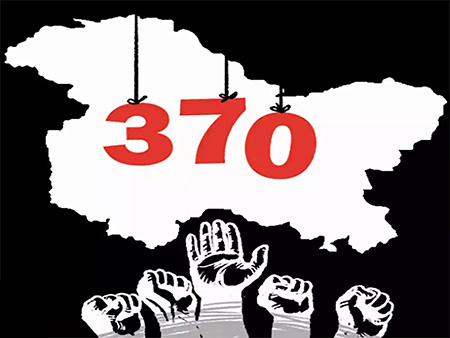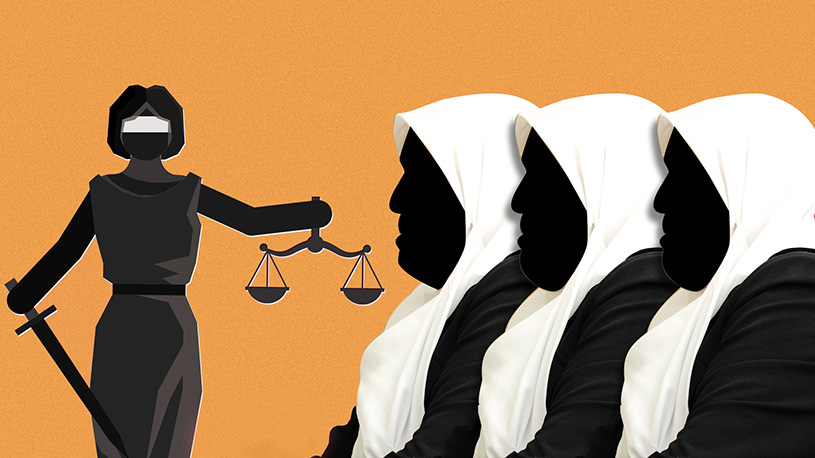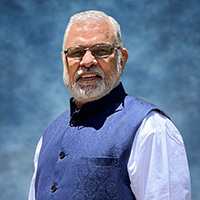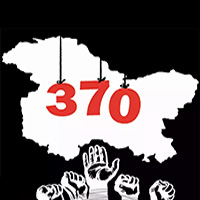ONCE AGAIN, Let us go over Article 370, Article 35A, CAA, NRC, and Triple talaq (instant divorce)!! by Raj Shah
 How Article 370 and Article 35A came to be…
How Article 370 and Article 35A came to be…
When India gained independence from the evil British Empire, the state of Jammu & Kashmir preferred to stay independent under Maharaja Hari Singh. Later in 1947, the Azad Kashmir Force, supported by the Pakistani army, attacked the Jammu & Kashmir state. Singh asked for help from the Indian Government. The Indian Government cleared all of the Jammu and Kashmir area and following that, Mountbatten (then, Indian Governor General) and Maharaja Hari Singh, the ruler of the state decided to join hands with the state of India and signed the Instrument of Accession on October 26, 1947.
| BEFORE Article 370 and Article 35A were removed | NOW After removing Article 370 and Article 35A |
| Special powers for Jammu & Kashmir State Government | No special powers for Jammu & Kashmir State Government (Same as all other states in India) |
| Dual citizenship, India and Jammu & Kashmir State | Single Indian citizenship (Same as all other citizen living in other states of India) |
| Separate constitution of Jammu & Kashmir State | Indian constitution in Jammu & Kashmir state (Same as all other states in India) |
| Separate flag for Jammu & Kashmir | Tricolor will be the only flag. |
| No reservation for minorities | Minorities will be eligible for 16% reservation. |
| Indian citizens from other states cannot buy land or property in Jammu & Kashmir State. | People from other states will now be able to purchase land or property in Jammu & Kashmir. |
| Children in the state did not have Right to Education (RTI). | Children in the state will benefit from Right to Education (RTI). |
| Duration of Legislative Assembly for 6 years | Assembly duration in the state of Jammu & Kashmir will be for 5 years. (Same as all other state Legislative Assembly) |
| If a woman from Jammu & Kashmir State marries out of state, she would lose the citizenship of the state. | If a woman marries out of state or country, she will still retain all her rights and Indian citizenship. |
| Panchayats (local city government and city councils) did not have any rights such as to implement free and fair elections.
The local people did not have any power to make decisions about their city. |
Panchayats (local city government and city councils) have the rights to implement free and fair elections. This system has placed local decision-making in the hands of local people and has greatly empowered women across India’s rural heartland. |
| Triple talaq (instant divorce) law did not apply to Muslims in Jammu & Kashmir State. | Triple talaq (instant divorce) law applies to all muslims, same as muslims living in all other states of India. |
| Women residents of Jammu & Kashmir lost their right to buy property in the erstwhile state if they married a non-local man. Their husbands and children were not treated as residents of Jammu & Kashmir and were also not allowed to inherit or buy property. | The spouses of women get domicile status even if they are non-local. They can now buy property and also apply for government jobs. |
| Women residents of Jammu & Kashmir did not have protection against domestic violence or any legal remedies. | Women residents of Jammu & Kashmir do have protection against domestic violence or any legal remedies. |
| The members of Scheduled Castes of Jammu & Kashmir do not have access to a number of affirmative action programs for educational, economic, and political opportunity. | The members of Scheduled Castes of Jammu & Kashmir will have access to a number of affirmative action programs for educational, economic, and political opportunity. |
| Children under the age of 14 did not have a right to education. It was also legal to marry children. | Children under the age of 14 will have a right to education. It is illegal to marry children. |
| The Hindu Kashmiri Pandits were stripped of their permanent residency with no way of gaining it back. | The Hindu Kashmiri Pandits finally can return to their ancestral homeland. |
| It was illegal to be gay in the state of Jammu & Kashmir | It is legal to be gay.(Same as all other states in India) |
| Many of India’s anti-corruption laws were not applicable in Kashmir. | Special agencies have been set up to combat corruption in government agencies and public sector businesses. |
What is Triple talaq (instant divorce) in India?

Under the Triple Talaq (instant divorce) provision, a Muslim man could legally divorce his wife by proclaiming three times consecutively the word talaq (the Arabic word for “divorce”) in spoken, written or, more recently, electronic form.
In March 2017, over 1 million Indian Muslims, a majority of whom were women, signed a petition to end instant Triple Talaq. The petition was started by the Muslim Rashtriya Manch, an Islamic organization in India. The petitioners against instant Triple Talaq have given evidence showing how the act is simply an innovation that does not have much to do with Quranic beliefs. This is supported by the interpretation of Quranic text by many Islamic scholars, historical evidence, and legal precedent
On May 13, 2017, during the hearings before its final judgment, the Supreme Court described instant Triple Talaq as the “worst form of marriage dissolution.” It noted that the custom is banned in the Muslim-majority countries of Saudi Arabia, Morocco, Afghanistan, and Pakistan Bangladesh and Sri Lanka along with 23 other countries worldwide. The Quran established means to avoid hasty divorces. It prescribes two waiting periods of three months before the divorce is final in order to give the husband time to reconsider his decision.
On August 22, 2017, the Indian Supreme Court deemed instant Triple Talaq (talaq-e-biddah) unconstitutional.
On July 30, 2019, the Parliament of India declared the practice of Triple Talaq illegal and unconstitutional and made it a punishable act from August 1, 2019.
Over the years, women organizations like Bharatiya Muslim Mahila Andolan and several others opposed this practice in particular and further demanded more reforms in Muslim personal laws.
What is the NRC list?
The National Register of Citizens (NRC) is a register containing names of all genuine Indian citizens. At present, only Assam has such a register.
The updated final NRC in Assam was released on August 31, with over 1.9 million applicants failing to make it to the list. This list includes 1.3 million Hindus.
How does one prove citizenship?
In Assam, one of the basic criteria was that the names of an applicant’s family members should either be in the first NRC prepared in 1951 or in the electoral rolls up to March 24, 1971. Other than that, applicants also had the option to present documents such as a refugee registration certificate, birth certificate, life insurance policy, land and tenancy records, citizenship certificate, passport, government-issued license or certificate, bank account, post office account, permanent residential certificate, government employment certificate, educational certificate, or court records.
What is CAA (Citizenship Amendment Act) 2019?
The Citizenship (Amendment) Act, 2019, was passed by the Parliament of India on December 11, 2019. It amended the Citizenship Act, 1955, by providing a pathway to Indian citizenship for persecuted religious minorities from Afghanistan, Bangladesh, and Pakistan who are Hindus, Sikhs, Buddhists, Jains, Parsis, or Christians and who arrived in India before the end of December 2014.
Muslims from Pakistan, Bangladesh, and Afghanistan are not offered eligibility for citizenship under the new act. Pakistan, Afghanistan, and Bangladesh are Muslim-majority countries that have modified their constitutions in recent decades to declare Islam their official state religion. Therefore, according to the Indian government, Muslims in these Islamic countries are “unlikely to face religious persecution.” The government says that Muslims cannot be “treated as persecuted minorities” in these Muslim-majority countries. The BBC says that while these countries have provisions in their constitutions guaranteeing non-Muslims rights, including the freedom to practice their religion, in practice, non-Muslim populations have experienced discrimination and persecution.
 About the Author
About the Author
A software engineer by profession, Indian culture enthusiast, ardent promoter of Hinduism, and a cancer survivor, Raj Shah is a managing editor of Desh-Videsh Magazine and co-founder of Desh Videsh Media Group. Promoting the rich culture and heritage of India and Hinduism has been his motto ever since he arrived in the US in 1969.
He has been instrumental in starting and promoting several community organizations such as the Indian Religious and Cultural Center and International Hindu University. Raj has written two books on Hinduism titled Chronology of Hinduism and Understanding Hinduism. He has also written several children books focusing on Hindu culture and religion.





























